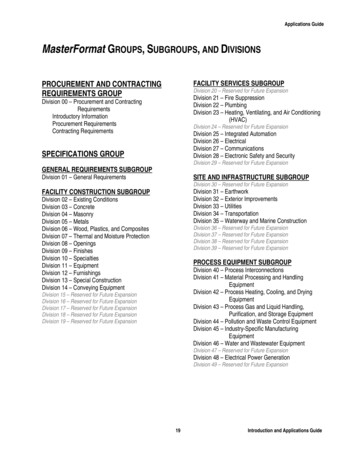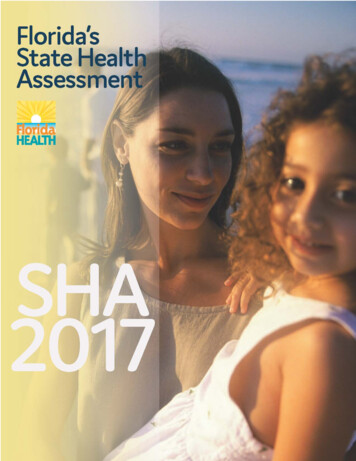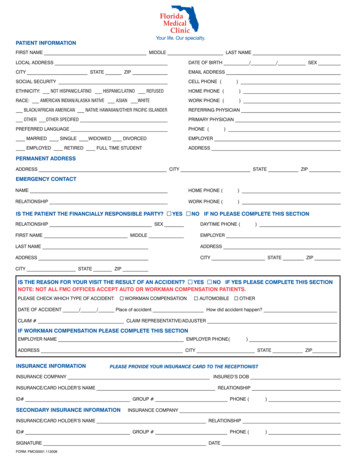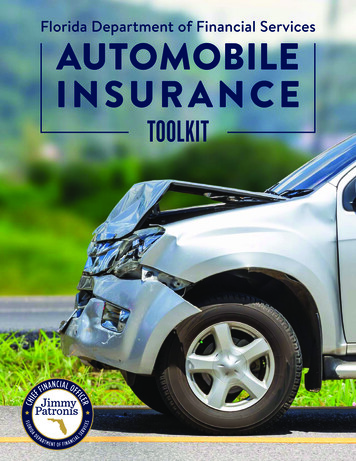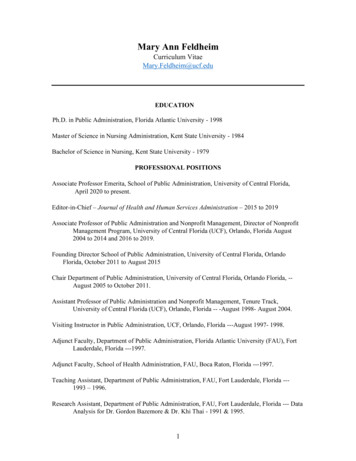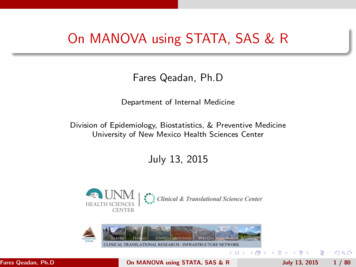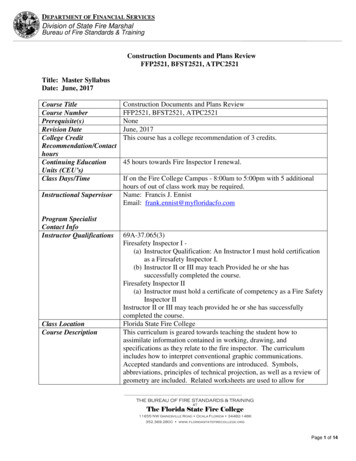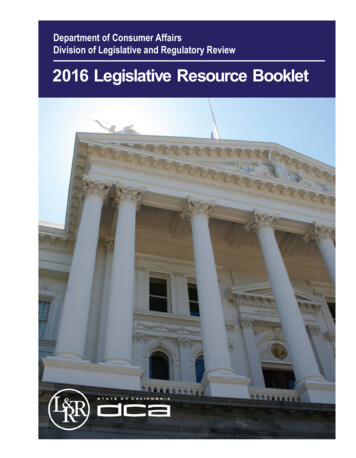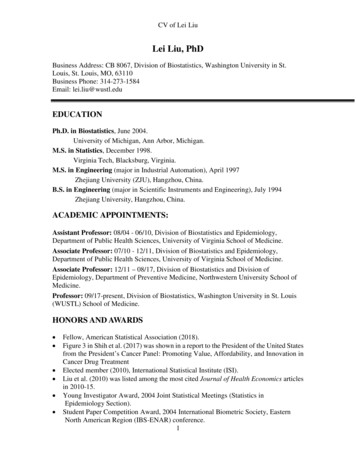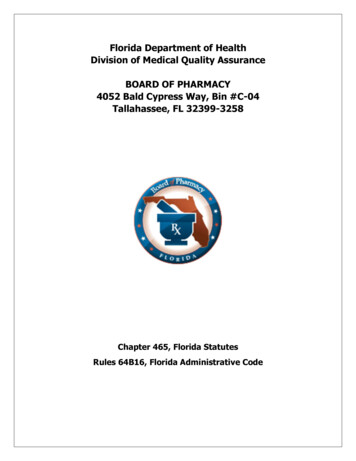
Transcription
Florida Department of HealthDivision of Medical Quality AssuranceBOARD OF PHARMACY4052 Bald Cypress Way, Bin #C-04Tallahassee, FL 32399-3258Chapter 465, Florida StatutesRules 64B16, Florida Administrative Code
INTRODUCTIONThe purpose of this booklet is to provide a central location for the Florida laws and rules, ofwhich the Board of Pharmacy, the Department of Health, and Florida licensed pharmacyprofessionals must adhere.All of the Florida statutes and administrative rules mentioned in this introduction are notincluded in this booklet but may be easily provided upon request. (Those in bold are included.)Chapter 465, Florida Statutes, is the law which governs the practice of pharmacy in the Stateof Florida. In addition to the law, the Board promulgates rules to further define the mandate ofthe law.Chapter 64B16, Florida Administrative Code, includes the rules promulgated by the Board ofPharmacy. The Board is required by law to promulgate certain rules to implement specificmandates with Chapters 465, 456, and 120, Florida Statutes. From these statutes, the Boardhas been delegated specific authority to promulgate other rules so long as the rules areconsistent with the laws.Chapter 456, Florida Statutes, is the law that governs the Department of Health. Within Chapter456, the Department’s and the Board’s scopes interrelate and intertwine. The Board must/maypromulgate rules for the purposes of carrying out the mandates set forth in Chapter 456.Chapter 120, Florida Statutes, is the Administrative Procedures Act. The purpose of the act is toensure that the general public has access to information regarding the functions and duties ofadministrative bodies, e.g. Board of Pharmacy and Department of Health, whose actions mayaffect the interests of private citizens.Under Chapter 120, The Administration Commission (the Governor and Cabinet) has adoptedmodel rules (Chapter 28) by which agencies are required to abide when dealing withrulemaking and hearing procedures to the extent that each agency does not adopt a specificrule of procedure covering the subject matter material contained in the model rules applicableto that agency.Complaints against a licensee (850) 245-4339Address for Board of Pharmacy:Department of HealthBoard of Pharmacy4052 Bald Cypress Way, Bin C-04Tallahassee, FL 32399Telephone: (850) 245-4474Facsimile: (850) 921-5389Email: info@floridaspharmacy.govWebsite: www.floridaspharmacy.gov
BOARD OF PHARMACYwww.floridaspharmacy.govTABLE OF CONTENTSDESCRIPTIONPAGE Chapter 465, Pharmacy . . .1 Division 64B16, Board of Pharmacy . .36o 64B16-25, Organization and Purpose. . .37o 64B16-26, Pharmacists Licensure . . .38o 64B16-27, Pharmacy Practice .66o 64B16-28, General Requirements – Permits .90o 64B16-29, Animal Control Shelter Permits 140o 64B16-30, Disciplinary Guidelines . .143o 64B16-32, Nonresident Pharmacies .163
Chapter 465Pharmacy465.001 Short Title.465.002 Legislative findings; intent.465.003 Definitions.465.004 Board of Pharmacy.465.005 Authority to make rules.465.006 Disposition of fees; expenditures.465.007 Licensure by examination.465.0075 Licensure by endorsement; requirements; fee.465.008 Renewal of license.465.009 Continuing professional pharmaceutical education.465.012 Reactivation of license; continuing education.465.0125 Consultant pharmacist license; application, renewal, fees; responsibilities; rules.465.0126 Nuclear pharmacist license; application, renewal, fees.465.013 Registration of pharmacy interns.465.014 Pharmacy technician.465.015 Violations and penalties.465.0155 Standards of practice.465.0156 Registration of nonresident pharmacies.465.0157 International export pharmacy permit.465.0158 Nonresident sterile compounding permit.465.016 Disciplinary actions.465.0161 Distribution of medicinal drugs without a permit.465.017 Authority to inspect; disposal.465.018 Community pharmacies; permits.465.0181 Community pharmacy permit required to dispense Schedule II or Schedule III controlled substances.465.019 Institutional pharmacies; permits.465.0193 Nuclear pharmacy permits.465.0196 Special pharmacy permits.465.0197 Internet pharmacy permits.465.022 Pharmacies; general requirements; fees.465.023 Pharmacy permittee; disciplinary action.465.0235 Automated pharmacy systems used by long-term care facilities, hospices, or state correctionalinstitutions.465.024 Promoting sale of certain drugs prohibited.465.0244 Information disclosure.465.025 Substitution of drugs.465.0251 Generic drugs; removal from formulary under specified circumstances.465.0252 Substitution of interchangeable biosimilar products.465.0255 Expiration date of medicinal drugs; display; related use and storage instructions.465.026 Filling of certain prescriptions.465.0265 Centralized prescription filling.465.0266 Common database.465.027 Exceptions.465.0275 Emergency prescription refill.465.0276 Dispensing practitioner.Revised 01/2020Page 1
465.1893465.1901Dispensing of medicinal drugs pursuant to facsimile of prescription.Rebates prohibited; penalties.Pharmacist’s order for medicinal drugs; dispensing procedure; development of formulary.Sale of medicinal drugs.Medicaid audits of pharmacies.Pharmacy audits; rights.Administration of vaccines and epinephrine autoinjection.Administration of antipsychotic medication by injection.Practice of orthotics and pedorthics.465.001 Short Title.—This chapter shall be known as the “Florida Pharmacy Act.”History.—ss. 1, 7, ch. 79-226; ss. 2, 3, ch. 81-318; ss. 26, 27, ch. 86-256; s. 59, ch. 91-137; s. 6, ch. 91-156; s.4, ch. 91-429.465.002 Legislative findings; intent.—The Legislature finds that the practice of pharmacy is a learnedprofession. The sole legislative purpose for enacting this chapter is to ensure that every pharmacist practicing inthis state and every pharmacy meet minimum requirements for safe practice. It is the legislative intent thatpharmacists who fall below minimum competency or who otherwise present a danger to the public shall beprohibited from practicing in this state.History.—ss. 1, 7, ch. 79-226; ss. 2, 3, ch. 81-318; ss. 1, 26, 27, ch. 86-256; s. 59, ch. 91-137; s. 6, ch. 91-156;s. 4, ch. 91-429.465.003 Definitions.—As used in this chapter, the term:(1) “Administration” means the obtaining and giving of a single dose of medicinal drugs by a legally authorizedperson to a patient for her or his consumption.(2) “Board” means the Board of Pharmacy.(3) “Consultant pharmacist” means a pharmacist licensed by the department and certified as a consultantpharmacist pursuant to s. 465.0125.(4) “Data communication device” means an electronic device that receives electronic information from onesource and transmits or routes it to another, including, but not limited to, any such bridge, router, switch, orgateway.(5) “Department” means the Department of Health.(6) “Dispense” means the transfer of possession of one or more doses of a medicinal drug by a pharmacist tothe ultimate consumer or her or his agent. As an element of dispensing, the pharmacist shall, prior to the actualphysical transfer, interpret and assess the prescription order for potential adverse reactions, interactions, anddosage regimen she or he deems appropriate in the exercise of her or his professional judgment, and thepharmacist shall certify that the medicinal drug called for by the prescription is ready for transfer. The pharmacistshall also provide counseling on proper drug usage, either orally or in writing, if in the exercise of her or hisprofessional judgment counseling is necessary. The actual sales transaction and delivery of such drug shall not beconsidered dispensing. The administration shall not be considered dispensing.(7) “Institutional formulary system” means a method whereby the medical staff evaluates, appraises, andselects those medicinal drugs or proprietary preparations which in the medical staff’s clinical judgment are mostuseful in patient care, and which are available for dispensing by a practicing pharmacist in a Class II or Class IIIinstitutional pharmacy.(8) “Medicinal drugs” or “drugs” means those substances or preparations commonly known as “prescription” or“legend” drugs which are required by federal or state law to be dispensed only on a prescription, but shall notinclude patents or proprietary preparations as hereafter defined.(9) “Patent or proprietary preparation” means a medicine in its unbroken, original package which is sold to thepublic by, or under the authority of, the manufacturer or primary distributor thereof and which is not misbrandedunder the provisions of the Florida Drug and Cosmetic Act.Revised 01/2020Page 2
(10) “Pharmacist” means any person licensed pursuant to this chapter to practice the profession of pharmacy.(11)(a) “Pharmacy” includes a community pharmacy, an institutional pharmacy, a nuclear pharmacy, a specialpharmacy, and an Internet pharmacy.1. The term “community pharmacy” includes every location where medicinal drugs are compounded, dispensed,stored, or sold or where prescriptions are filled or dispensed on an outpatient basis.2. The term “institutional pharmacy” includes every location in a hospital, clinic, nursing home, dispensary,sanitarium, extended care facility, or other facility, hereinafter referred to as “health care institutions,” wheremedicinal drugs are compounded, dispensed, stored, or sold.3. The term “nuclear pharmacy” includes every location where radioactive drugs and chemicals within theclassification of medicinal drugs are compounded, dispensed, stored, or sold. The term “nuclear pharmacy” doesnot include hospitals licensed under chapter 395 or the nuclear medicine facilities of such hospitals.4. The term “special pharmacy” includes every location where medicinal drugs are compounded, dispensed,stored, or sold if such locations are not otherwise defined in this subsection.5. The term “Internet pharmacy” includes locations not otherwise licensed or issued a permit under this chapter,within or outside this state, which use the Internet to communicate with or obtain information from consumers inthis state and use such communication or information to fill or refill prescriptions or to dispense, distribute, orotherwise engage in the practice of pharmacy in this state. Any act described in this definition constitutes thepractice of pharmacy as defined in subsection (13).(b) The pharmacy department of any permittee shall be considered closed whenever a Florida licensedpharmacist is not present and on duty. The term “not present and on duty” shall not be construed to prevent apharmacist from exiting the prescription department for the purposes of consulting or responding to inquiries orproviding assistance to patients or customers, attending to personal hygiene needs, or performing any otherfunction for which the pharmacist is responsible, provided that such activities are conducted in a mannerconsistent with the pharmacist’s responsibility to provide pharmacy services.(12) “Pharmacy intern” means a person who is currently registered in, and attending, a duly accredited collegeor school of pharmacy, or who is a graduate of such a school or college of pharmacy, and who is duly andproperly registered with the department as provided for under its rules.(13) “Practice of the profession of pharmacy” includes compounding, dispensing, and consulting concerningcontents, therapeutic values, and uses of any medicinal drug; consulting concerning therapeutic values andinteractions of patent or proprietary preparations, whether pursuant to prescriptions or in the absence andentirely independent of such prescriptions or orders; and conducting other pharmaceutical services. For purposesof this subsection, “other pharmaceutical services” means the monitoring of the patient’s drug therapy andassisting the patient in the management of his or her drug therapy, and includes review of the patient’s drugtherapy and communication with the patient’s prescribing health care provider as licensed under chapter 458,chapter 459, chapter 461, or chapter 466, or similar statutory provision in another jurisdiction, or such provider’sagent or such other persons as specifically authorized by the patient, regarding the drug therapy. However,nothing in this subsection may be interpreted to permit an alteration of a prescriber’s directions, the diagnosis ortreatment of any disease, the initiation of any drug therapy, the practice of medicine, or the practice ofosteopathic medicine, unless otherwise permitted by law. “Practice of the profession of pharmacy” also includesany other act, service, operation, research, or transaction incidental to, or forming a part of, any of the foregoingacts, requiring, involving, or employing the science or art of any branch of the pharmaceutical profession, study,or training, and shall expressly permit a pharmacist to transmit information from persons authorized to prescribemedicinal drugs to their patients. The practice of the profession of pharmacy also includes the administration ofvaccines to adults pursuant to s. 465.189 and the preparation of prepackaged drug products in facilities holdingClass III institutional pharmacy permits.(14) “Prescription” includes any order for drugs or medicinal supplies written or transmitted by any means ofcommunication by a duly licensed practitioner authorized by the laws of the state to prescribe such drugs ormedicinal supplies and intended to be dispensed by a pharmacist. The term also includes an orally transmittedorder by the lawfully designated agent of such practitioner. The term also includes an order written ortransmitted by a practitioner licensed to practice in a jurisdiction other than this state, but only if the pharmacistcalled upon to dispense such order determines, in the exercise of her or his professional judgment, that the orderis valid and necessary for the treatment of a chronic or recurrent illness. The term “prescription” also includes aRevised 01/2020Page 3
pharmacist’s order for a product selected from the formulary created pursuant to s. 465.186. Prescriptions maybe retained in written form or the pharmacist may cause them to be recorded in a data processing system,provided that such order can be produced in printed form upon lawful request.(15) “Nuclear pharmacist” means a pharmacist licensed by the department and certified as a nuclear pharmacistpursuant to s. 465.0126.(16) “Centralized prescription filling” means the filling of a prescription by one pharmacy upon request byanother pharmacy to fill or refill the prescription. The term includes the performance by one pharmacy foranother pharmacy of other pharmacy duties such as drug utilization review, therapeutic drug utilization review,claims adjudication, and the obtaining of refill authorizations.(17) “Automated pharmacy system” means a mechanical system that delivers prescription drugs received from aFlorida licensed pharmacy and maintains related transaction information.(18) “Compounding” means combining, mixing, or altering the ingredients of one or more drugs or products tocreate another drug or product.(19) “Outsourcing facility” means a single physical location registered as an outsourcing facility under the federalDrug Quality and Security Act, Pub. L. No. 113-54, at which sterile compounding of a drug or product isconducted.(20) “Compounded sterile product” means a drug that is intended for parenteral administration, an ophthalmicor oral inhalation drug in aqueous format, or a drug or product that is required to be sterile under federal or statelaw or rule, which is produced through compounding, but is not approved by the United States Food and DrugAdministration.(21) “Central distribution facility” means a facility under common control with a hospital holding a Class IIIinstitutional pharmacy permit that may dispense, distribute, compound, or fill prescriptions for medicinal drugs;prepare prepackaged drug products; and conduct other pharmaceutical services.(22) “Common control” means the power to direct or cause the direction of the management and policies of aperson or an organization, whether by ownership of stock, voting rights, contract, or otherwise.History.—ss. 1, 7, ch. 79-226; s. 322, ch. 81-259; ss. 14, 15, ch. 81-302; ss. 2, 3, ch. 81-318; ss. 1, 2, ch. 82179; s. 1, ch. 83-101; s. 36, ch. 83-216; s. 3, ch. 83-265; s. 29, ch. 83-329; s. 1, ch. 85-35; ss. 2, 26, 27, ch. 86256; s. 1, ch. 88-172; s. 1, ch. 89-77; s. 59, ch. 91-137; s. 6, ch. 91-156; s. 4, ch. 91-429; s. 123, ch. 94-218; s.239, ch. 97-103; s. 87, ch. 97-264; s. 118, ch. 99-397; s. 1, ch. 2002-182; s. 1, ch. 2004-25; s. 1, ch. 2004-387;s. 2, ch. 2007-152; s. 2, ch. 2012-60; s. 1, ch. 2014-148; s. 1, ch. 2018-95.465.004 Board of Pharmacy.—(1) The Board of Pharmacy is created within the department and shall consist of nine members to be appointedby the Governor and confirmed by the Senate.(2) Seven members of the board must be licensed pharmacists who are residents of this state and who havebeen engaged in the practice of the profession of pharmacy in this state for at least 4 years and, to the extentpracticable, represent the various pharmacy practice settings. Of the pharmacist members, two must be currentlyengaged in the practice of pharmacy in a community pharmacy; two must be currently engaged in the practice ofpharmacy in a Class II, Modified Class II, or Class III institutional pharmacy; and three must be pharmacistslicensed in this state irrespective of practice setting. The remaining two members must be residents of the statewho have never been licensed as pharmacists and who are in no way connected with the practice of theprofession of pharmacy. No person may be appointed as a consumer member who is in any way connected witha drug manufacturer or wholesaler. At least one member of the board must be 60 years of age or older. TheGovernor shall appoint members to the board in accordance with this subsection as members’ terms expire or asa vacancy occurs until the composition of the board complies with the requirements of this subsection.(3) As the terms of the members expire, the Governor shall appoint successors for terms of 4 years, and suchmembers shall serve until their successors are appointed.(4) All provisions of chapter 456 relating to activities of the board shall apply.History.—ss. 1, 7, ch. 79-226; ss. 2, 3, ch. 81-318; ss. 3, 26, 27, ch. 86-256; s. 16, ch. 87-172; s. 59, ch. 91137; s. 6, ch. 91-156; s. 4, ch. 91-429; s. 124, ch. 94-218; s. 88, ch. 97-264; s. 67, ch. 98-166; s. 124, ch. 2000160; s. 1, ch. 2014-113; s. 2, ch. 2018-95.Revised 01/2020Page 4
465.005 Authority to make rules.—The Board of Pharmacy has authority to adopt rules pursuant to ss.120.536(1) and 120.54 to implement the provisions of this chapter conferring duties upon it.History.—ss. 1, 7, ch. 79-226; ss. 2, 3, ch. 81-318; ss. 4, 26, 27, ch. 86-256; s. 59, ch. 91-137; s. 6, ch. 91-156;s. 4, ch. 91-429; s. 126, ch. 98-200.465.006 Disposition of fees; expenditures.—All moneys received under this chapter shall be deposited andexpended pursuant to the provisions of s. 456.025. All expenditures for duties of the board authorized by thischapter shall be paid upon presentation of vouchers approved by the executive director of the board.History.—ss. 1, 7, ch. 79-226; ss. 2, 3, ch. 81-318; ss. 26, 27, ch. 86-256; s. 59, ch. 91-137; s. 6, ch. 91-156; s.4, ch. 91-429; s. 68, ch. 98-166; s. 125, ch. 2000-160.465.007 Licensure by examination.—(1) Any person desiring to be licensed as a pharmacist shall apply to the department to take the licensureexamination. The department shall examine each applicant who the board certifies has:(a) Completed the application form and remitted an examination fee set by the board not to exceed 100 plusthe actual per applicant cost to the department for purchase of portions of the examination from the NationalAssociation of Boards of Pharmacy or a similar national organization. The fees authorized under this section shallbe established in sufficient amounts to cover administrative costs.(b) Submitted satisfactory proof that she or he is not less than 18 years of age and:1. Is a recipient of a degree from a school or college of pharmacy accredited by an accrediting agencyrecognized and approved by the United States Office of Education; or2. Is a graduate of a 4-year undergraduate pharmacy program of a school or college of pharmacy locatedoutside the United States, has demonstrated proficiency in English by passing both the Test of English as aForeign Language (TOEFL) and the Test of Spoken English (TSE), has passed the Foreign Pharmacy GraduateEquivalency Examination that is approved by rule of the board, and has completed a minimum of 500 hours in asupervised work activity program within this state under the supervision of a pharmacist licensed by thedepartment, which program is approved by the board.(c) Submitted satisfactory proof that she or he has completed an internship program approved by the board. Nosuch board-approved program shall exceed 2,080 hours, all of which may be obtained prior to graduation.(2) The department may permit an applicant who has satisfied all requirements of subsection (1), except thoserelating to age or the internship program, to take the written examination, but the passing of the examinationshall confer no rights or privileges upon the applicant in connection with the practice of pharmacy in this state.(3) Except as provided in subsection (2), the department shall issue a license to practice pharmacy to anyapplicant who successfully completes the examination in accordance with this section.History.—ss. 1, 7, ch. 79-226; ss. 13, 15, 23, 25, 30, 34, 62, ch. 80-406; ss. 2, 3, ch. 81-318; s. 30, ch. 83-329;ss. 5, 26, 27, ch. 86-256; s. 13, ch. 88-205; s. 59, ch. 91-137; s. 6, ch. 91-156; s. 4, ch. 91-429; s. 240, ch. 97103.465.0075 Licensure by endorsement; requirements; fee.—(1) The department shall issue a license by endorsement to any applicant who applies to the department andremits a nonrefundable fee of not more than 100, as set by the board, and whom the board certifies:(a) Has met the qualifications for licensure in s. 465.007(1)(b) and (c);(b) Has obtained a passing score, as established by rule of the board, on the licensure examination of theNational Association of Boards of Pharmacy or a similar nationally recognized examination, if the board certifiesthat the applicant has taken the required examination;(c)1. Has submitted evidence of the active licensed practice of pharmacy, including practice in community orpublic health by persons employed by a governmental entity, in another jurisdiction for at least 2 of theimmediately preceding 5 years or evidence of successful completion of board-approved postgraduate training or aboard-approved clinical competency examination within the year immediately preceding application for licensure;or2. Has completed an internship meeting the requirements of s. 465.007(1)(c) within the 2 years immediatelypreceding application; andRevised 01/2020Page 5
(d) Has obtained a passing score on the pharmacy jurisprudence portions of the licensure examination, asrequired by board rule.(2) An applicant licensed in another state for a period in excess of 2 years from the date of application forlicensure in this state shall submit a total of at least 30 hours of board-approved continuing education for the 2calendar years immediately preceding application.(3) The department may not issue a license by endorsement to any applicant who is under investigation in anyjurisdiction for an act or offense that would constitute a violation of this chapter until the investigation iscomplete, at which time the provisions of s. 465.016 apply.(4) The department may not issue a license by endorsement to any applicant whose license to practicepharmacy has been suspended or revoked in another state or who is currently the subject of any disciplinaryproceeding in another state.History.—s. 1, ch. 2001-166; s. 1, ch. 2008-216.465.008 Renewal of license.—(1) The department shall renew a license upon receipt of the renewal application, verification of compliance withs. 465.009, and receipt of a fee set by the board not to exceed 250.(2) The department shall adopt rules establishing a procedure for the biennial renewal of licenses.(3) Any person licensed under this chapter for 50 years or more is exempt from the payment of the renewal ordelinquent fee, and the department shall issue a lifetime license to such a person.History.—ss. 1, 7, ch. 79-226; ss. 2, 3, ch. 81-318; ss. 6, 26, 27, ch. 86-256; s. 7, ch. 90-341; s. 59, ch. 91-137;s. 6, ch. 91-156; s. 4, ch. 91-429; s. 178, ch. 94-119; s. 32, ch. 2001-277.465.009 Continuing professional pharmaceutical education.—(1) No license renewal shall be issued by the department until the licensee submits proof satisfactory to theboard that during the 2 years prior to her or his application for renewal the licensee has participated in not lessthan 30 hours of continuing professional pharmaceutical education in courses approved by the board.(2) The board shall approve only those courses that build upon the basic courses offered in the curricula ofaccredited colleges or schools of pharmacy, and the board shall require that the provider meets the educationalstandards for the program design, administration, and evaluation established by the board.(3) Upon initial licensure, the department may reduce the number of required hours consistent with therequirements of biennial renewal.(4) The department may make exception from the requirements of this section in an emergency or hardshipcase.(5) The board may adopt rules within the requirements of this section that are necessary for its implementation,including a rule creating a committee composed of equal representation from the board, the colleges of pharmacyin the state, and practicing pharmacists within the state, whose purpose shall be to approve the content of eachcourse offered for continuing education credit prior to the time such course is offered.(6) Notwithstanding subsections (1)-(5):(a) Each pharmacist certified to administer a vaccine or epinephrine autoinjection under s. 465.189 mustcomplete a 3-hour continuing education course, which shall be offered by a statewide professional association ofphysicians in this state accredited to provide educational activities designated for the American MedicalAssociation Physician’s Recognition Award (AMA PRA) Category I credit, on the safe and effective administrationof vaccines and epinephrine autoinjection as part of biennial relicensure or recertification. This course may beoffered in a distance-learning format and must be included in the 30 hours of continuing professionalpharmaceutical education specified in subsection (1).(b) Each pharmacist must submit confirmation of having completed the course specified in paragraph (a) on aform provided by the board when submitting fees for license renewal.(c) Failure to comply with paragraphs (a) and (b) results in the revocation of the authorization for a pharmacistto administer a vaccine or epinephrine autoinjection under s. 465.189. Such authorization may be restored uponcompletion of such requirements.History.—ss. 1, 7, ch. 79-226; ss. 2, 3, ch. 81-318; ss. 7, 26, 27, ch. 86-256; s. 59, ch. 91-137; s. 6, ch. 91-156;s. 4, ch. 91-429; s. 241, ch. 97-103; s. 1, ch. 2002-184; s. 3, ch. 2012-60.Revised 01/2020Page 6
465.012 Reactivation of license; continuing education.—(1) The board shall prescribe by rule continuing education requirements as a condition of reactivating a license.The continuing education requirements for reactivating a license shall be at least 15 classroom hours for eachyear the license was inactive in addition to completion of the number of hours required for renewal on the datethe license became inactive.(2) The board shall adopt rules relating to application procedures for inactive status, to the biennial renewal ofinactive licenses, and to the reactivation of licenses. The board shall prescribe by rule an application fee forinactive status, a renewal fee for inactive status, a delinquency fee, and a fee for the reactivation of a license.None of these fees may exceed the biennial renewal fee established by the board for an active license. Thedepartment may not reactivate a license unless the inactive or delinquent licensee has paid any applicablebiennial renewal or delinquency fee, or both, and a reactivation fee.History.—ss. 1, 7, ch. 79-226; s. 323, ch. 81-259; ss. 2, 3, ch. 81-318; ss. 2, 30, ch. 82-179; s. 3, ch. 83-265;ss. 8, 26, 27, ch. 86-256; s. 8, ch. 90-341; s. 59, ch. 91-137; s. 6, ch. 91-156; s. 4, ch. 91-429; s. 179, ch. 94119.465.0125 Consultant pharmacist license; application, renewal, fees; responsibilities; rules.—(1) The department shall issue or renew a consultant pharmacist license upon receipt of an initial or renewalapplication which conforms to the requirements for consultant pharmacist initial licensure or renewal aspromulgated by the board by rule and a fee set by the board not to exceed 250. The consultant pharmacist shallbe responsible for maintaining all drug records required by law and for establishing drug handling procedures forthe safe handling and storage of drugs. The consultant pharmacist may also be responsible for ordering andevaluating any laboratory or clinical testing when, in the judgment of the consultant pharmacist, such activity isnecessary for the proper performance of the consultant pharmacist’s responsibilities. Such laboratory or clinicaltesting may be ordered only with regard to patients residing in a nursing home facility, and then only whenauthorized by the medical director of the nursing home facility. The consultant pharmacist must have completedsuch addit
Chapter 465, Florida Statutes, is the law which governs the practice of pharmacy in the State of Florida. In addition to the law, the Board promulgates rules to further define the mandate of the law. Chapter 64B16, Florida Administra
